|
|
|
Sort Order |
|
|
|
Items / Page
|
|
|
|
|
|
|
| Srl | Item |
| 1 |
ID:
103068
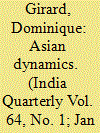

|
|
|
| 2 |
ID:
152425
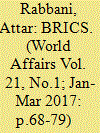

|
|
|
|
|
| Summary/Abstract |
Challenging projections about the growth and influence of BRICS, Attar Rabbani argues that instead of rivalling the G-7, BRICS could become a distant memory if growth figures decline within member nations. Geopolitics, entrenched structural complexities together with confliting interests would pull apart the constituent units of the conclave sooner rather than later.
|
|
|
|
|
|
|
|
|
|
|
|
|
|
|
|
| 3 |
ID:
192562


|
|
|
|
|
| Summary/Abstract |
The new challenge facing the G7 is how to elicit support and cooperation from developing and emerging countries for Ukraine—a challenge that can be addressed particularly by initiative from Japan, which has worked together with all countries on an equal footing. Based on the outcomes from the G7 Hiroshima Summit, we look ahead to Japan’s next move.
|
|
|
|
|
|
|
|
|
|
|
|
|
|
|
|
| 4 |
ID:
142563


|
|
|
|
|
| Summary/Abstract |
This article provides a case study in the new and developing field of inter-organisational relations by looking at the position of the European Union (EU) within the Group of Eight (G8). It analyses the questions of why inter-organisational relations start, and how they develop over time. I argue that inter-organisational relations are determined by the dynamics within the international organisations that are involved: both the characteristics that define these organisations, as well as the preferences of their constituent parts. The G8-EU relation was a by-product of European integration resulting from the transfer of competences, but was initially thwarted by the strong and divided preferences within the EU. While the G8’s informality at first facilitated this internal division, it also enabled this relation to change over the following decades. This change cannot only be ascribed to rationalist and social-institutionalist factors but also testifies to a logic of path dependence.
|
|
|
|
|
|
|
|
|
|
|
|
|
|
|
|
| 5 |
ID:
088079
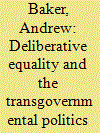

|
|
|
|
|
| Publication |
2009.
|
| Summary/Abstract |
Revisiting the concept of transgovernmentalism, originally developed by Robert Keohane and Joseph Nye, can shed considerable light on the nature of interstate cooperation in contemporary global financial governance. Transgovernmentalism highlights how certain technocratic policy communities, composed of finance ministries, central banks, and regulators, dominate the global financial architecture. It also provides insights into the political and social basis of these actors' interactions and deliberations. Most importantly, renovating the concept of transgovernmentalism brings the participatory deficits in the current global financial architecture into sharp focus and points us in the direction of a workable reform agenda that would expand inclusion and participation. This article advocates basing future reform on efforts to achieve a closer realization of the principle of "deliberative equality." Unfortunately, "transgovernmentalism" is incompatible with deliberative equality, meaning that it is precisely the transgovernmental characteristics of the current global financial architecture that have to be challenged and overturned if we are to arrive at anything approximating deliberative equality.
|
|
|
|
|
|
|
|
|
|
|
|
|
|
|
|
| 6 |
ID:
168330


|
|
|
|
|
| Summary/Abstract |
In this study the non-parametric method of Data Envelopment Analysis (DEA) is applied to determine the technical efficiency (TE) index of the G7 countries, when variable returns to scale (VRS) hold for the entire period under consideration (1993–2016). As inputs labor and capital are used while we utilize GDP as output. In the second stage of our analysis the DEA bootstrap approach along the lines of Simar and Wilson (2007) is applied to deal with the disadvantages of a non-parametric DEA set up. Through this procedure we investigate the relationship between the efficiency evaluation of DMUs as calculated by the DEA method, in the first stage of our analysis, and the variables of arable land, total greenhouse gas emissions and total primary energy consumption. In addition, for these variables and through the estimated regression coefficients, elasticities and marginal effects of both TE and GDP index are calculated.
|
|
|
|
|
|
|
|
|
|
|
|
|
|
|
|
| 7 |
ID:
140159


|
|
|
|
|
| Summary/Abstract |
Political events in 2014 brought to the fore a more fundamental disagreement between Russia and the West about the European security architecture and the distribution of power in Russia's neighborhood in general. Yet political implications are far broader, and likely to be felt for years, moving Russia closer to emerging powers such as China and India, but also to Brazil.
|
|
|
|
|
|
|
|
|
|
|
|
|
|
|
|
| 8 |
ID:
110232


|
|
|
|
|
| Publication |
2012.
|
| Summary/Abstract |
GLOBALLY, 1.5 BILLION PEOPLE LIVE IN COUNTRIES AFFECTED BY VIOLENT
conflict. International aid to fragile and conflict-affected states accounts for 30
percent of global official development assistance (ODA) flows. However, no
low-income fragile or conflict-affected country has yet to achieve a single
Millennium Development Goal (MDG). For the first time, a group of these
countries have joined together to discuss their shared development challenges
and advocate for better international policies to address their needs. Calling
themselves the "g7+," this group represents an important new voice in the debate over aid effectiveness and it carries high expectations. This article describes the rise of the g7+ and attempts to answer the question on everyone's
mind: Can it deliver?
|
|
|
|
|
|
|
|
|
|
|
|
|
|
|
|
| 9 |
ID:
096246


|
|
|
|
|
| Publication |
2010.
|
| Summary/Abstract |
If the G's are the world's steering committee, the step from G7 to G20 deepened the democratic legitimacy of this committee. However, it also shifted influence to a group that share little else other than economic power: they have diverse experiences, challenges, cultural perspectives and starting points. This is particularly the case in the field of financial regulation, where action across these countries in recent months-despite all the language of global regulation-is increasingly local. The prospect of the new global being quite local has dismayed some. But it need not. This article challenges the dichotomy of more global versus more local. It argues that financial internationalism-greater cooperation by nations for the benefit of all-is better served by institutions that help to integrate diverse systems than those which try to enforce one-size-fits-all approach to very different economies.
International banks persuaded regulators of the benefits of home country regulation and a level playing field for bankers. But the benefits accrued largely to the banks in the boom and proved an avenue for contagion during the crash. Host country regulation may prove a safer way to regulate financial systems, in particular by allowing regulation to be more responsive to national economic conditions and cycles. It is likely that a shift back to host country regulation will act as a drag on international capital flows. The instinct of economists is that the cost of this is uncertain, suspect and conditional, especially when compared to the costs of financial crashes. Host country regulation does not mean there is no role for international institutions, such as the newly minted Financial Stability Board. Instead, it suggests a more nuanced role, potentially encompassing the policing of international market infrastructure, financial protectionism, information free flow between regulators and the convergence of regulatory principles and the consolidation of regulatory instruments. An informed and collegiate process of integrating different financial systems will be a more resilient system than one which tries to apply a single rule book across inherently different countries.
|
|
|
|
|
|
|
|
|
|
|
|
|
|
|
|
| 10 |
ID:
116362


|
|
|
|
|
| Publication |
2012.
|
| Summary/Abstract |
Regular meetings of heads of state and government seem, in 2012, a common feature of international affairs. About forty years ago, however, such meetings did not really exist: ad hoc summits were the rule. Comparing the emergence of the European Council in 1974 and the G7 in 1975, this article explains why and how summitry has become routine in international politics. To do so, it examines the common roots of both summits, points out the first differences between the two institutions, and, finally, underlines the common challenges they faced and the logic they shared. Taken together, these three parts underline how, despite their obvious differences, the European Council and the G7 created a new dimension of international politics.
|
|
|
|
|
|
|
|
|
|
|
|
|
|
|
|
| 11 |
ID:
142207
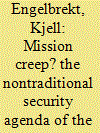

|
|
|
|
|
| Summary/Abstract |
In 2008–2011, the Group of 20 swiftly eclipsed the Group of 7, created in the mid-1970s as an informal mechanism for stabilizing markets and facilitating transnational currency exchange and investment. Several observers have expressed the view that the former, broader group is also destined to appropriate the role of the Group of 8, the G7's pioneering successor in the realm of nontraditional security. This article examines the G7/8 legacy of forging quasi-permanent institutional arrangements and frameworks in this policy area and goes on to gauge nontraditional security initiatives subsequently launched by the G-20. Having juxtaposed the past record of these bodies and analyzed the interests and power dynamics that influence member state action in the short and long term, the article outlines three basic options for how the relationship between the G-20 and the G7/8 may evolve.
|
|
|
|
|
|
|
|
|
|
|
|
|
|
|
|
| 12 |
ID:
146723
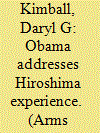

|
|
|
| 13 |
ID:
192459


|
|
|
|
|
| Summary/Abstract |
THE NATO Vilnius summit, which took place on July 11-12, 2023, became a summit of the alliance's self-determination in the sense that the alliance effectively embarked on a clear anti-Russian course. In their final communique, NATO members described Russia as "the most significant and direct threat to Allies' security and to peace and stability in the Euro-Atlantic area." Alliance members also issued several statements of support for the Kiev regime.
|
|
|
|
|
|
|
|
|
|
|
|
|
|
|
|
| 14 |
ID:
109577
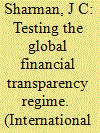

|
|
|
|
|
| Publication |
2011.
|
| Summary/Abstract |
How can we tell whether rules that apply in theory actually do so in practice? Realists argue that the gap between what formal rules proscribe and their effectiveness may be particularly wide at the international level. Furthermore, dominant states may impose costly standards on others that they themselves choose not to implement. To test these propositions, the article assesses the effectiveness of international soft law standards prohibiting anonymous participation in the global financial system by seeking to break these standards. The findings indicate that the prohibition on anonymous corporations is relatively ineffective and is flouted much more in G7 countries than in tax havens. The article contributes to and extends the work of realist scholars in international political economy, both in their skepticism of formal rules and focus on the effects of power. Evidence is drawn from the author's solicitations and purchases of anonymous shell companies from 45 corporate service providers in 22 countries.
|
|
|
|
|
|
|
|
|
|
|
|
|
|
|
|
|
|
|
|
|